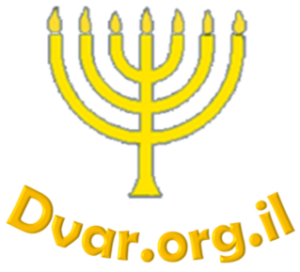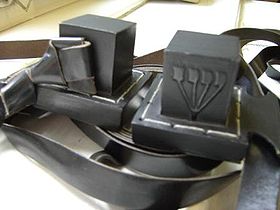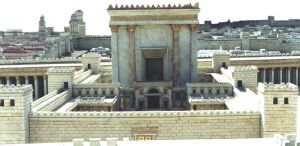
Parshat Shemini deals, in part, with the deaths of Nadav and Avihu, the two sons of Aaron. From this incident we gain an insight into some of the practices that Jews observe when in mourning. The Torah warns the priests not to mourn over the death of Nadav and Avihu by admonishing them, saying: (Leviticus 10:6): “Do not leave your heads unshorn and do not rend your garments”. It was not due to a shortcoming in Nadav and Avihu that the priests were forbidden to mourn, rather because of the obligations of the priesthood. Usually in a case of mourning, the Kohen Gadol (High Priest) is the ONLY Kohen not permitted to let his hair go unshorn. The Rambam tells us that the Kohen Gadol would cut his hair every Friday as a sign of his most exalted and important position he occupied in Jewish life. But the sentence quoted above is directed to all Kohanim (priests), so why were they included in this prohibition as well?
The death of the sons of Aaron took place during the inauguration of the Mishkan (Tabernacle), which was filled with and accompanied by great joy. Due to the high levels of happiness and joy, all Kohanim were prohibited from mourning because they were all involved in inaugurating the Temple almost as equals to the Kohen Gadol himself.
As a result, these two signs of mourning, unshorn hair and rending of garments, were prohibited, yet under normal circumstances when an individual is a mourner, including a regular Kohen, one’s hair is left unshorn and garments are rent.
One should perform kriah (rending of one’s garments) upon the death of any of the following family members: mother, father, sister, brother, half-sister, half -brother, daughter, son, or spouse. The reason for rending one’s garments is to express grief rather than repressing it.
One can truly appreciate the Divine nature of the Bible when psychologists agree that the repression of grief is unhealthy for the individual. There is no doubt that grief can and will manifest itself in many different ways. Many will talk about the great loss they have suffered while others might simply vent ones feelings through crying and emotional pain.
Our Rabbis have told us that because of the individual’s need to grieve and mourn, Jews have the obligation to rend garments. Three reasons are offered to explain why the rendering of a garment would be beneficial. The first, explained by Rabbi Abner Weiss, in “Death and Bereavement”, is that by rending garments we can appreciate how the act symbolises the relation of the body to the soul. As the Kabbalah writes: “The body is nothing more than the outer garment of the eternal soul.” The tearing of our clothes does not affect our bodies and the death of our body does not affect the eternity of our souls.
The second reason is a sign of a broken heart. When the deceased is being readied for burial what words can help anyone cope with or come to grips with the enormous loss just experienced. By tearing a garment, the mourner realises no one or nothing can ever replace the family member just lost. Thirdly, if one tears clothing at the funeral, one is saying how can any materialistic possession have any worth when a beloved relative is being readied for burial. No matter what the explanation, the need for an outlet of grief is a necessary component to the grieving process. Kriah, rending of garments, is the way to begin the process, by properly channeling and expressing our grief.
There is a well known teaching in the Talmud that Rabbi Yochanan ben Zakai blessed his disciples, saying, “May the fear of Heaven be upon you as the fear of flesh and blood.” His disciples were astonished, and they said, “That is all?” He replied, “Would it be so. Know that when a person commits a sin, he asks himself if anyone else will see it.”
The reality might well be that when a person sins he asks himself if anyone else will see it. Nevertheless, we must still ask, “That is all?” It appears as if this teaching of the Talmud is equating fear of Heaven with fear of flesh and blood. Can it be said that this is the summit of our aspirations, and nothing more? Isn’t this a low level to be our goal in life?
It seems that Rabbi Yochanan ben Zakai did not want to equate the fear of Heaven with the fear of flesh and blood. He only wanted to describe the type of fear which a person needs to aspire to. In other words, he should feel his fear of Heaven as something real and concrete, just as he feels that the things he sees through his sense of vision are real and concrete. Abstract, intellectual knowledge is not enough to prevent a person from sinning. He must feel with his emotions, and it must appear to him as if G-d is really standing in front of him, looking and overseeing his every movement, hearing and paying attention to the thoughts of his heart, and G-d’s attention is not turned away for even a second. The holiday of Pesach, and especially the night of the Seder, implant the root of faith in the heart of every Jew. He does not imbibe the lesson of faith through abstract, intellectual learning only. He learns through actions and practice. “In every generation, every person is obligated to see himself as if he went out of Egypt.”
One sits on cushions and pillows like a prince. One speaks at length about how his fathers were, at first, idolators. Then he relives the pain of the persecution. He eats bitter herbs. He dips into the mortar (i.e., the charoset) until he sees with his mind’s eye the punishment of his oppressors and how those that abused him receive plague upon plague and calamity upon calamity. All this serves to deepen and implant the lesson of faith into his mind and soul. The rituals performed on this night expand a person’s awareness of his Creator, of Divine Providence over every individual, over every step. Progress through the various activities of the night imbues within him knowledge of G-d. “You have known my sitting and my arising, You understand my mind’s will from afar” (Psalms 139:2).
On this night the children of Israel speak at length about the liberation from Egypt. Over and over again they remind themselves that there is a Master to the palace. Even if a person would want to do the opposite of G-d’s Will he would not be able, because “Where could I go from Your spirit, and where could I escape from Your face” (ibid., 7). Moreover, all the limbs of his body are involved in this reliving and imbibing the lesson of faith. Starting with this night, for a whole week, he will only eat matzah, which is called “the bread of faith.”
The holiday of Pesach is the first holiday of the year. The progression of the seasons in the Jewish calendar begins with Pesach. Since it is the first, the beginning, it is the root, and it is proper that the root of all that follows should be faith. The prophet Chabakuk described all the mitzvot as standing upon one root, one foundation, when he said, “The righteous live by their faith” (Chabakuk 2:4). To the extent that a person is rooted in faith, to that same extent he can succeed in the goal expressed by the verse, “I have placed G-d before me always” (Psalms 16:8).
It is emphasised in the Hagaddah that even sages and wise elders are commanded to tell the story of the liberation from Egypt. In his commentary on the Hagaddah, Rabbi Ehrlinger asks why this point needs to be emphasised. Are not all the mitzvot commanded equally to everyone? It seems that it might have been thought that the mitzvah of speaking about the liberation from Egypt was commanded to inform those who have not yet heard about it. Therefore, the author of the Hagadah reveals that the mitzvah includes everyone, even those who already know the story in all its details, because the main aspect of the mitzvah is to give thanksgiving and to praise G-d for His miracles as it is explained in the Sefer Hamitzvot of the Rambam. Therefore, even if everyone already knows, there would still be a mitzvah to tell the story.
Accordingly, it is understandable that anyone who increases the amount that he speaks about the liberation is to be praised. Even a person who thinks that by speaking about it he does not add any new ideas to himself – he is still obligated to increase praise and thanksgiving.
These words that even sages and wise elders are obligated to speak about the liberation are recited immediately after the section “We were slaves to Pharaoh in Egypt, and G-d took us out from there….” In other words, we should not think that by reciting this first section we have fulfilled our obligation, but we must continue to tell the story because everyone is obligated to increase praises and this is praiseworthy. Moreover, the Rambam adds, “All those who increase their praises of G-d, and praise Him constantly, are themselves praiseworthy.”
The holy rabbi, Rebbe Yechezkiel of Kuzmir was very strict about all the laws of Pesach. He himself would sweep and clean the room where the necessities for Pesach were kept. Despite this, he would not allow any of these articles to be placed on the floor. Even if a bottle were placed on the floor he would not drink from it during the holiday. The wheat which was put aside for Pesach was wrapped in a sack, and the sack was placed inside a barrel. The barrel was also wrapped in a sack, and it was hung from the ceiling by a rope. When it was necessary to cut the rope in order to lower the barrel to take the wheat to be ground, the Rebbe said, “Hurry and bring a knife which is kosher for Pesach.”
One of the Chasidim who was there was wondering about all this overly strict scrupulousness of the Rebbe. The Rebbe then turned to him with the following explanation: We have learned that the most minute amount of chametz (chametz ‘bemashehu’) mixed with other food on Pesach disqualifies its use. However, the Hebrew word “bemashehu” also means “according to who he is.” In other words, the prohibition of chametz on Pesach applies to every individual according to who he is, and according to his level.
His grandson, the holy Rebbe Yisrael of Modzitz added that this is like what we find in the laws of purity and impurity where various degrees of defilement render different things impure. Concerning non-sanctified food (chulin), only first degree defilement renders it impure. Concerning terumah (set aside for cohanim – priests), second degree defilement also renders it impure. Concerning kadashim (sacrifices), third degree defilement renders impure; and concerning chata’ot (sin offerings in the Temple) even fourth degree defilement renders it impure.
The Kotzker Rebbe related to all this by asking, “If the Torah was so strict about the punishment for chametz on Pesach, and if it commanded us to go to such lengths to keep away from it, then it would have been better if it had commanded us not to eat wheat products at all on Pesach, not even matzah. Therefore, why did the Torah command us, and even encourage us to eat matzah?” The Kotzker then answered, “It does not require any great wisdom to refrain from eating. The wisdom and discipline is to eat while guarding against prohibited foodstuffs….”
SHABBAT SHALOM





